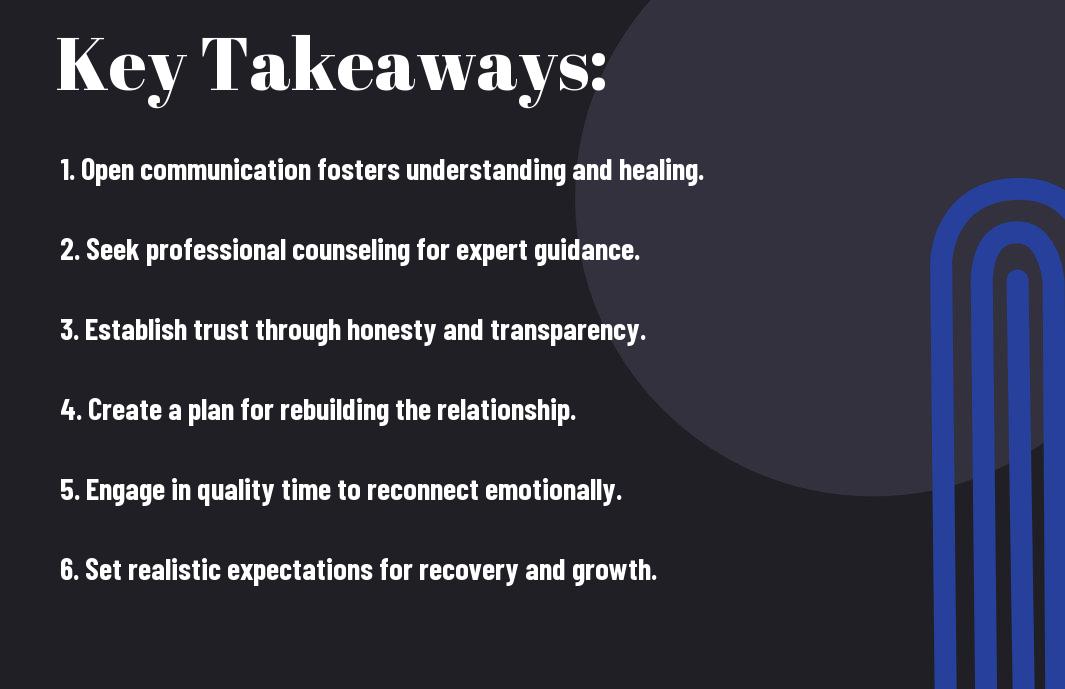Over time, a long-term affair can fracture the very foundation of your marriage, leaving deep emotional scars. You may feel lost, hurt, or even angry, but it’s vital to understand that healing is possible. This blog post will guide you through vital steps and support services designed to help you navigate this challenging journey. By taking proactive measures, you can work towards revitalizing your relationship and fostering a deeper, more committed connection with your partner.
Key Takeaways:
- Open communication is vital; both partners must express their feelings and experiences honestly.
- Seek professional assistance, such as couples therapy, to navigate the complexities of rebuilding trust.
- Establish boundaries to create a safe space for the healing process and avoid triggers.
- Take time to reflect on the relationship’s strengths and weaknesses and identify areas for growth.
- Focus on rebuilding intimacy through shared activities and experiences that strengthen the bond.
- Patience is key, as healing from an affair is a gradual process that requires understanding.
- Working towards forgiveness can help both partners move forward, even if it seems challenging initially.

Understanding the Impact of a Long-Term Affair
To navigate the aftermath of a long-term affair, it’s imperative to understand the profound effect it can have on your relationship. These impacts often extend beyond the initial betrayal, influencing emotional well-being, trust, and overall relationship dynamics. Recognizing these challenges is the first step towards healing and repair.
Emotional Consequences
For many, the emotional fallout from a long-term affair can be devastating. You may experience feelings of hurt, betrayal, and anger, which can lead to anxiety and depression. These emotions can be overwhelming and may even cloud your judgment, making it difficult to see a path toward reconciliation.
Trust Issues
Among the most significant challenges that arise after an affair are trust issues. You may find it difficult to believe your partner’s words or intentions, leading to heightened suspicion and doubt. These feelings can create an environment of constant tension and insecurity in your relationship, as you grapple with the fear of future betrayals.
Plus, dealing with trust issues requires ongoing communication and patience. You must express your feelings openly while also giving your partner the chance to rebuild their credibility. A commitment to transparency and honesty is imperative. Engaging in couples therapy can facilitate a safe space for both of you to discuss your fears and expectations. This collaborative effort can serve as a foundation for rebuilding trust, fostering a renewed sense of safety and connection in your marriage.

Assessing Relationship Readiness for Repair
One significant step in repairing a marriage affected by an affair is assessing your relationship’s readiness for repair. This involves evaluating whether both partners are open to the healing process and willing to address underlying issues. Recognizing the state of your relationship can help you determine the most effective steps forward, guiding you to seek necessary support and services.
Identifying Willingness to Rebuild
About identifying willingness to rebuild, it’s crucial to engage in open and honest conversations with your partner. You both need to express your feelings about the relationship, the affair, and your future together. This dialogue will reveal whether both parties are ready to invest the emotional energy required for healing.
Evaluating Mutual Commitment
Relationship commitment plays a vital role in the healing process following an affair. Willingness to recommit involves both partners acknowledging past mistakes while expressing a sincere desire to move forward together. Evaluating your mutual commitment means discussing your expectations and agreeing upon a plan for rebuilding trust. As you confront your emotional needs, it becomes imperative to foster an environment of honesty and accountability, allowing yourselves to create a stronger bond built on trust and understanding for the future.
Steps to Initiate the Healing Process
Your journey toward healing starts with a commitment to understanding and addressing the deep-rooted issues that led to the affair. This process will require both partners to engage in a series of intentional steps aimed at rebuilding trust and intimacy. Open and effective communication, clear boundaries, and professional guidance are imperative to facilitate a meaningful recovery.
Open and Honest Communication
Honest dialogue is fundamental in the healing process. Both partners must share their emotions, pain, and fears without holding back. This safe space for expression fosters understanding, allowing you to confront the realities of the affair and reinforcing your commitment to the marriage moving forward.
Establishing Ground Rules
Before moving forward, it’s imperative to set clear ground rules to protect your relationship. This might include agreements on transparency, communication channels, and boundaries regarding interactions with others. Establishing these rules can reduce potential conflicts and misunderstandings, promoting a healthier environment for healing.
This process of establishing ground rules helps create a safe framework that fosters trust and accountability in your relationship. You may consider defining specific communication methods for discussing your feelings, agreeing to a no-contact rule with the affair partner, and setting boundaries around your social interactions. Ensuring both partners express their needs and expectations will strengthen your commitment and create a shared vision for the future. Be prepared to revisit and adjust these rules as needed, reinforcing a sense of security and collaboration throughout your healing journey.

Seeking Professional Help
All couples experiencing the fallout from an affair can benefit from professional guidance. Seeking 7 Ways to Rebuild Your Marriage After Infidelity can provide you with valuable strategies and support. Engaging a therapist who specializes in infidelity can help you navigate feelings of betrayal, build trust, and improve communication in your relationship.
Couples Therapy
Along with addressing the specific issues that arise from an affair, couples therapy creates a safe space for both partners to express their emotions. A trained therapist can facilitate open dialogue, helping you and your partner understand each other’s perspectives and work towards healing together.
Individual Counseling
Above all, individual counseling offers you a chance to explore your thoughts and feelings related to the affair independently. This personalized support can be imperative for your personal growth and emotional well-being as you cope with the aftermath of infidelity.
Help from a licensed therapist can provide you with a comprehensive understanding of your emotions and behaviors. It can also aid in identifying the patterns that led to the affair. Individuals often discover their own strengths and areas for improvement, leading to personal empowerment. It’s especially important to address feelings of anger, betrayal, or insecurity you may experience, allowing you to navigate through these feelings positively. Engaging in individual counseling can set you on a path towards self-discovery and emotional healing, which is imperative for rebuilding your marriage.
Rebuilding Trust and Intimacy
Once again, the foundation of your relationship is put to the test as you focus on rebuilding trust and reestablishing intimacy. This process requires patience and commitment from both partners. Engage in open dialogue about feelings and expectations, invest time in shared activities, and work to create a safe environment where vulnerability is welcomed. By fostering honesty and deepening your connection, you can gradually restore the bond that was once broken.
Transparency and Accountability
Beside rebuilding intimacy, it’s crucial to establish transparency and accountability in your relationship. This means sharing details about daily activities and being open about emotions. Giving each other access to communications and support systems helps eliminate doubts, proving your commitment to change. By prioritizing honesty and recognizing each other’s efforts, both partners can begin to feel secure in their newly forged path together.
Reconnecting Emotionally
To deepen your relationship, emotional reconnection is key. You have to focus on expressing vulnerability and sharing your individual experiences. Take the time to understand each other’s perspectives and feelings regarding the affair, and actively work together toward healing. By openly discussing your emotions, you nurture empathy and understanding, allowing both partners to feel a renewed sense of closeness. Additionally, setting aside distractions—such as phones and social media—enables you to have meaningful conversations and fortifies the emotional bond, ultimately helping you build a brighter future together.
Emotionally reconnecting involves actively participating in each other’s lives and building empathy through shared experiences. Organizing regular date nights or engaging in couples therapy can encourage deeper conversations. Pay attention to your partner’s needs and create a space where both of you feel heard and validated. This process can take time, so be patient and willing to explore each other’s emotions. As trust begins to grow, you’ll find it easier to navigate challenges together and strengthen your emotional connection.
Developing a New Relationship Foundation
For a marriage to heal after a long-term affair, it is important to develop a new relationship foundation built on trust, communication, and mutual respect. You need to actively engage in redefining your partnership, allowing both you and your partner to express your needs and feelings openly. This process requires both of you to be committed to rebuilding your relationship, as well as acknowledging the past while focusing on the future with a united sense of purpose.
Setting Goals for the Future
Beside rekindling emotional intimacy, setting shared goals can help you and your partner to envision a bright future together. Identify what you both want to achieve as individuals and as a couple. Establishing clear, attainable, and meaningful goals creates a sense of direction and fosters teamwork, reinforcing the bond you share.
Creating Shared Experiences
One way to solidify your new foundation is by creating shared experiences that foster connection and intimacy. Engaging in activities together, whether it’s exploring new hobbies or revisiting cherished memories, enhances emotional bonding and helps to rebuild trust.
Further, forming shared experiences allows you and your partner to forge new memories that stand in contrast to the hurt caused by an affair. It’s important to prioritize activities that you both enjoy and that can spark joy and laughter in your relationship. This can be anything from taking a cooking class to begining on weekend getaways. By actively participating in these experiences, you can strengthen your emotional connection and reaffirm your commitment to each other, ultimately moving towards a healthier and more fulfilling relationship.
Final Words
Hence, navigating the aftermath of a long-term affair requires patience, understanding, and strategic steps. You need to prioritize open communication with your partner, explore professional counseling services, and establish boundaries that foster trust again. Taking accountability for your actions is vital, as is cultivating an atmosphere where both partners feel safe expressing their feelings. By actively engaging in these processes, you can work towards healing and rebuilding your marriage, ultimately transforming your relationship into a stronger and more resilient partnership.
FAQ
Q: What are the initial steps to take when addressing a long-term affair in a marriage?
A: The first steps include open communication between partners. Both individuals should express their feelings honestly, acknowledging the affair and its impact on the relationship. It’s also important to set a safe space for discussing emotions and concerns without blame. Seeking the help of a licensed marriage counselor can assist in facilitating these conversations effectively.
Q: How can a couple rebuild trust after an affair?
A: Rebuilding trust requires time, consistency, and transparency from the partner who had the affair. They should be willing to share their actions and whereabouts while showing genuine remorse. The betrayed partner should also engage in the process, allowing for gradual re-establishment of trust. Regular check-ins, accountability, and openness to discussing feelings can foster a rebuilding environment. Professional guidance can enhance this process significantly.
Q: Are there specific services that can aid in marriage repair following an affair?
A: Yes, numerous services can support the repair process. Couples therapy or marriage counseling can provide a neutral space to address underlying issues. Support groups for partners affected by infidelity may also offer a sense of community and shared experiences. Additionally, relationship workshops and online resources focusing on rebuilding intimacy and communication skills can be beneficial.
Q: How important is it for both partners to take responsibility for the marriage’s issues?
A: It is quite important for both partners to acknowledge their roles in the relationship’s dynamics. While the affair may be a significant breach, underlying issues often contribute to relationship dissatisfaction. Taking shared responsibility helps both partners to feel invested in the repair process, encourages collaboration, and promotes mutual understanding, which is vital for long-term success.
Q: How long does it typically take for a couple to recover from a long-term affair?
A: The recovery timeline varies widely based on the couple’s commitment, the severity of the affair, and the underlying relationship issues. Some couples may experience significant improvement in their relationship within months, while others might take years to fully recover. Patience, consistent communication, and ongoing support are key factors that influence the pace of healing.
